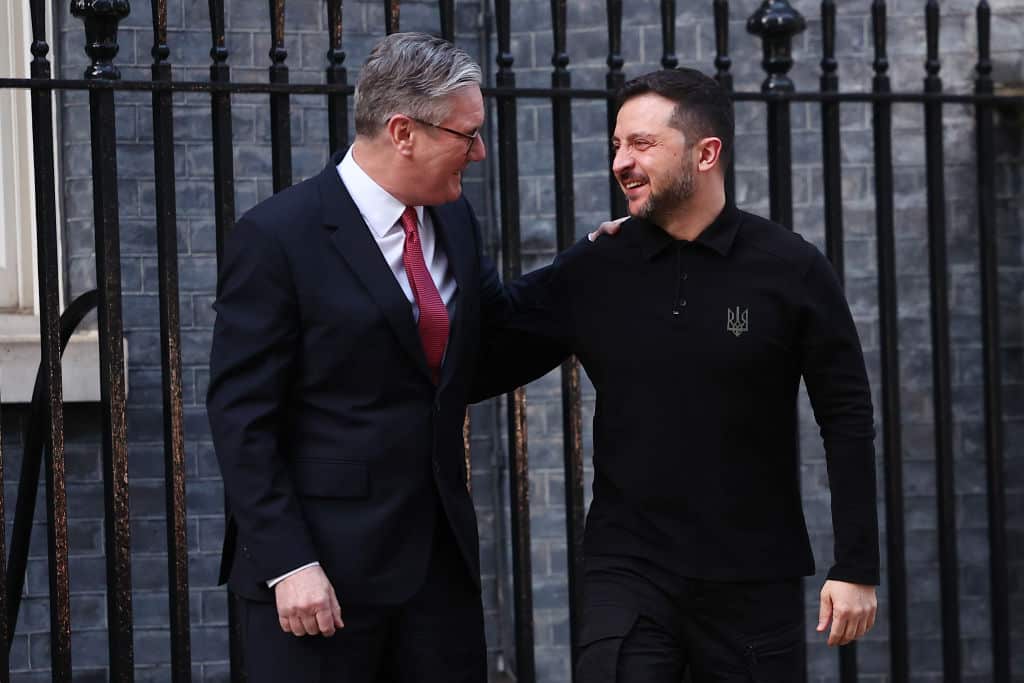Sir Keir Starmer is facing criticism from a Catholic bishop after he slashed foreign aid to re-arm Britain and fund Ukraine’s war with Russia.
Bishop Stephen Wright of Hexham and Newcastle accused the Labour Prime Minister of taking a decision that will cripple development in some of the poorest and most undeveloped countries of the world.
“Aid cuts cost lives,” said Bishop Wright, chair of Cafod, the Catholic agency for overseas development of the Bishops’ Conference of England and Wales.
He said: “With so many in the world suffering the impacts of poverty, climate change and conflict – not least in Ukraine, Sudan and the DRC – cuts to international aid removes a lifeline for many of our poorest sisters and brothers.
“Decisions made in the UK have very human consequences around the globe,” he continued.
“Families unable to grow food because of the climate crisis, children not able to go to school, and people going untreated and unvaccinated for curable diseases.
“Reducing aid not only increases suffering, it makes the world less safe for all of us.”
Bishop Wright added: “This year is a Jubilee Year for the Church – a time of hope, journeying together, and resetting injustices, not a time for turning our backs on those in need.
“The Government shouldn’t be balancing the books at the expense of the poorest communities around the world.”
He also urged Catholics to <a href="https://action.cafod.org.uk/page/166896/action/1"><mark style="background-color:rgba(0, 0, 0, 0)" class="has-inline-color has-vivid-cyan-blue-color">write to their MPs to oppose the reductions in overseas spending.</mark></a>
He said: “Let them know you oppose these cuts, and that it’s more critical than ever that the UK supports the world’s most vulnerable communities. Visit the CAFOD site to contact your MP.”
Sir Keir announced last week he would cut the Official Development Assistance (ODA) budget from 0.5 per cent of gross national income – a sum of more than £15 billion - to 0.3 per cent by 2027, the lowest level since 1999.
Simultaneously, he will boost defence spending by 2.5 per cent in the same period, an increase of £13.4 billion every year.
Sir Keir told Parliament that slashing the aid budget “is not an announcement I am happy to make”.
He said: “I am proud of our pioneering record on overseas development, and we will continue to play a key humanitarian role in Sudan, in Ukraine and in Gaza, tackling climate change, supporting multinational efforts on global health and challenges like vaccination.”
But he said it was important to “stand behind the people of Ukraine” and to “change our national security posture”.
The Prime Minister said: “That will demand some extremely difficult and painful choices, and through those choices, as hard as they are, we must also seek unity, a whole society, effort that will reach into the lives, the industries and the homes of the British people.”
Christine Allen, director of CAFOD, said the decision of the Labour Government meant, however, “that, in some of the most vulnerable places on earth, more people will die and many more will lose their livelihoods”.
She said: “Coming so soon after the USAID freeze, this is another lifeline being pulled away from those in desperate need, at a time when the world feels increasingly precarious.
“The UK has a choice to make: to support those in need or turn our backs on them. What we decide speaks to the very core of who we want to be as a society.
“If we are seeing the decline of aid to support the world’s most vulnerable communities, then the Government must redouble its efforts to reform the global debt system, to enable those most in need to emerge from poverty.”
Soon after the announcement, Anneliese Dodds quit as International Development Minister, warning Sir Keir that the cuts would encourage Russia and China to reshape the international order.
She said also said that it would be “impossible” to maintain development projects in Gaza, Sudan and Ukraine with the reduced budget.
Sir Keir later announced a £1.6 billion deal to supply thousands of advanced air-defence missiles to Ukraine after US President Donald Trump upbraided Ukrainian President Volodymyr Zelenskyy for “gambling with World War Three” by refusing to negotiate either a ceasefire or a peace deal with Russia.
In a fiery exchange in the White House, Mr Trump pointed out that Ukraine was running out of troops, suggesting that for the conflict to continue it would have to escalate into at least a wider European war involving nuclear powers.
The near collapse of relations between the leaders of Ukraine and the United States prompted an emergency summit in London in which Sir Keir sought to assemble a “coalition of the willing” to support Mr Zelenskyy.
“Not every country will feel able to contribute,” he said at the meeting attended by the leaders of many European countries, but “those willing will intensify planning now with real urgency”.
Sir Keir added: “The UK is prepared to back this with boots on the ground and planes in the air.”
<em>(Photo by Peter Nicholls/Getty Images)</em>



